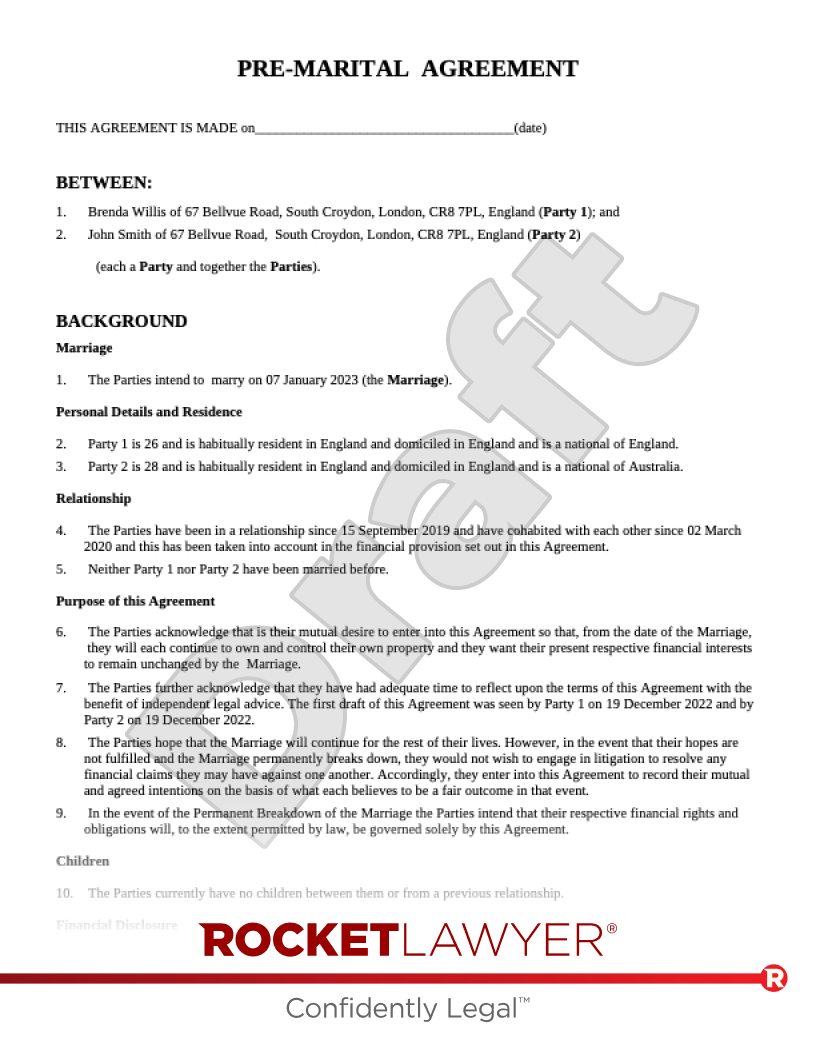Which documents will I need when living with my partner?
Couples are increasingly choosing to live together without getting married or forming a civil partnership. This is often referred to as ‘cohabiting’. However, cohabiting with a partner does not create the same rights as marriage or civil partnership. Nevertheless, you can provide yourselves with legal and financial security by making a Cohabitation agreement. A cohabitation agreement can cover issues such as:
-
financial arrangements
-
steps for getting parental responsibility for any children you have
-
reviewing wills and lasting powers of attorney (LPAs)
-
which assets belong to whom and how these should be shared if you split up
If one of you has moved into your partner’s place you might want to make a Change of address letter to notify people of this. This is especially useful when telling your bank and employer that you have moved.
You should also consider making a Last will and testament to set out how your belongings should be distributed in the event of your death. If you already have a will in place, you may wish to make a brand new version (eg if there have been substantial changes in your life) or to make minor adjustments to your will using a Codicil.
Which documents will I need when buying property with my partner?
When buying a property with another person, you should be aware that there are 2 ways to do this: as joint tenants or as tenants in common.
If you are joint tenants, when one of you dies the other will usually automatically own the whole property.
If you are tenants in common, you will own the property in shares, which can be equal or unequal. When a person dies their share of the property forms part of their estate and passes under their will. Therefore, whoever they have left their share of the property to in their will will inherit it and not (automatically) the other co-owner.
There are many reasons couples might choose to buy a property as tenants in common, such as one partner putting more money into the deposit, one partner contributing more to the mortgage, or one partner wishing to leave their share of the property to someone else (eg their child). If this is the case, you should create a Declaration of trust to record each person’s contributions to ensure that, when the property is sold, each person gets back the proportion of the proceeds they put in.
Should I make a prenup?
A Prenuptial agreement might not be the most romantic thing to think about, but it is important to consider protecting your assets. Prenups set out how finances will be divided and debts resolved if you and your partner get divorced (or dissolve your civil partnership).
Prenuptial agreements are not legally binding in England and Wales. However, courts generally take them into consideration as long as certain safeguards are met. To find out how to properly prepare your prenup, read How to make a prenup.
If you and your partner have already gotten married or entered into a civil partnership, a prenup won’t be suitable. Instead, you can consider making a Postnuptial agreement. Postnups are essentially the same as prenups, with the difference being that they’re entered into after a marriage or civil partnership.
What happens to my will when I get married?
If you have a will, marriage will automatically revoke it. Therefore, you should make a new will to set out your wishes. Some of the things you can include in your will are:
-
specific gifts to people
-
a guardian for your children
-
whether you want to leave the rest of your estate to your partner
If you do not make a will (or do not have a valid will when you die), the intestacy rules will apply when you die. These dictate how your estate will be inherited. Married partners and civil partners will often inherit under these intestacy rules while cohabiting partners typically won’t.
What documents can help us look after our children?
If your family is growing via your own pregnancy, a Birth plan helps you set out your labour, delivery and postpartum preferences. If you are adopting or having a child through surrogacy, you should familiarise yourselves with the relevant processes. For more information, read Adoption and Surrogacy.
If you already have children, you can use Babysitting instructions to provide clear instructions to a babysitter about how best to look after your children.
Use a Child travel consent form to provide written permission for your child to travel without you. For example, if your child is travelling internationally with one parent only or fully on their own.
You should also familiarise yourself with your rights and responsibilities as parents and with your children’s rights and responsibilities.
Make these documents so that you and your partner can celebrate the next steps in your relationship knowing that you are legally protected. Ask a lawyer if you have any questions or concerns.
Note that, if you are in Scotland, some legal situations may be different. Ask a lawyer to find out more.





